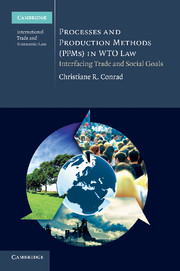Book contents
- Frontmatter
- Contents
- List of figures and tables
- Preface and acknowledgements
- Table of GATT 1947 Reports
- Table of WTO Reports
- List of abbreviations
- Introduction
- I Foundations: the relevance of NPA measures at the interface of domestic regulation, economic globalization and world trade law
- 1 Setting the stage for legal analysis
- 2 Putting the debate into perspective: analysis of the socio-economic context
- II Legal analysis: reviewing the status of NPA measures de lege lata
- III Outlook: new perspectives on the legal status of NPA measures
- Summary and concluding remarks
- Bibliography
- Index
1 - Setting the stage for legal analysis
Published online by Cambridge University Press: 05 June 2011
- Frontmatter
- Contents
- List of figures and tables
- Preface and acknowledgements
- Table of GATT 1947 Reports
- Table of WTO Reports
- List of abbreviations
- Introduction
- I Foundations: the relevance of NPA measures at the interface of domestic regulation, economic globalization and world trade law
- 1 Setting the stage for legal analysis
- 2 Putting the debate into perspective: analysis of the socio-economic context
- II Legal analysis: reviewing the status of NPA measures de lege lata
- III Outlook: new perspectives on the legal status of NPA measures
- Summary and concluding remarks
- Bibliography
- Index
Summary
Legal uncertainty relating to measures linked to non-physical aspects under the law of the WTO is not a new phenomenon. Albeit with a focus on measures linked to processes and production methods (PPMs), it has been debated intensely in legal, economic and political circles since the early 1970s. Nevertheless, most legal questions underlying the debate have remained unsettled. The fact that this analysis builds on a decades-old debate facilitates the analysis in some respects, but also raises difficulties. The debate has given structure to the large problem-field, and it has developed concepts, some of which are used in this analysis. However, other concepts and terms developed and used in the debate have remained blurred, and their usefulness is doubtful. The intention of this chapter is to illustrate the topic and to identify the concepts and terms used in the subsequent parts of this analysis. It begins with a brief illustration of the topic detached from the legal debate, followed by a description of the landmark cases of GATT and WTO dispute settlement. The next section focuses on the debate that emerged around these disputes, the so-called ‘PPM debate’. It describes the basic concepts and terms developed for and used in this debate. Section 1.2 briefly reviews the legal status of the most important types of measures relevant to the debate in order to identify the legal core issues.
- Type
- Chapter
- Information
- Processes and Production Methods (PPMs) in WTO LawInterfacing Trade and Social Goals, pp. 11 - 63Publisher: Cambridge University PressPrint publication year: 2011



